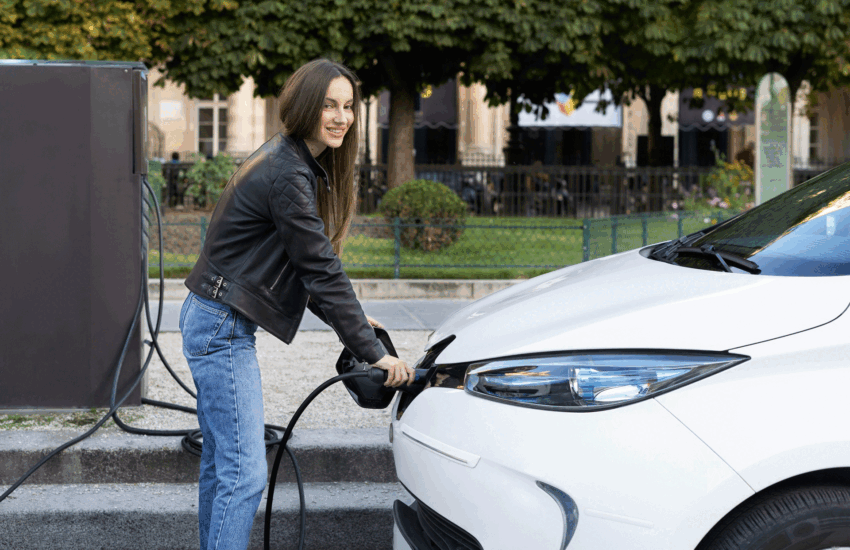Words by Sebastian Fuchs, Managing Director of Digital Products and Services at AutoData Middle East
Organizations shouldn’t be building from scratch. The way I think of it is around “train tracks” that the organizations have built to handle, for instance, privacy, security, and basic data governance.
The United Arab Emirates’ (UAE) automotive landscape is undergoing a transformative shift. With growing global focus on sustainability, electric vehicles (EVs) have captured the attention of both consumer and industry stakeholders’ alike. According to a study by Statista, Electric Vehicle unit sales in the United Arab Emirates are expected to reach 36,620 in 2029, and further growth is projected thanks to the emergence of new EV brands and the country’s evolving infrastructure to support this flourishing market.
Sustainability is at the forefront of this transformation, with electric vehicles playing a key role in the UAE’s mission to reduce carbon emissions by 70% by 2050. Beyond their zero tailpipe emissions, EVs directly support the nation’s commitment to shrinking its carbon footprint and embracing cleaner, greener technologies. However, the real environmental impact of EVs hinges on the energy powering them. As the UAE accelerates its shift toward renewable energy, the positive effects of EV adoption will only intensify, further amplifying their contribution to a more sustainable future.
While traditional petrol and diesel-powered vehicles continue to dominate, the growing adoption of EVs signals a significant trend that cannot be overlooked. According to Auto Data Middle East’s 2024 Q1 UAE Used Car Market Report, in 2023, EVs and hybrid vehicles made up 4.5% of the UAE’s total market share. Though this may appear modest, it is an important marker of steady progress, especially given the region’s historical preference for conventional fuel vehicles. The UAE government’s active promotion of sustainable transport, including its commitment to establishing over 10,000 charging stations by 2030, is setting the stage for accelerated EV adoption.
The comparison between petrol and diesel vehicles, and electric vehicles, offers interesting insights into the future of the automotive market. As per our studies, while petrol-powered vehicles currently account for a substantial 93.2% of market share, the benefits of EVs are beginning to shift consumer sentiment. Electric vehicles, though associated with higher upfront costs, offer long-term financial advantages. Lower fuel costs, reduced maintenance expenses due to fewer moving parts, and government incentives such as reduced registration fees are contributing to the growing appeal of EVs. In fact, EV owners can expect fuel savings of up to 30% annually compared to conventional petrol vehicles, according to our research.
Infrastructure, long considered a barrier to EV adoption, is also undergoing significant improvement. As of 2022, our report noted that there were only 325 charging stations in the UAE, which contributed to range anxiety and hesitation among potential buyers. However, the government’s ambitious plan to increase this significantly in the next five to six years will undoubtedly alleviate concerns and encourage broader acceptance of electric mobility.
One of the most exciting developments in the automotive landscape is the rapid expansion of the used EV market. At AutoData Middle East, we have observed a remarkable 250% increase in demand for used electric vehicles in 2023. This reflects rising consumer confidence in EV technology and an acknowledgment of the cost savings and environmental benefits associated with electric vehicles. Our analysis of 3-year residual values has also revealed that EVs have consistently retained higher values than their petrol and diesel counterparts, an evident sign of their increasing market presence. As more consumers opt for used EVs, the market will continue to expand, offering additional opportunities for both buyers and sellers.
Despite the many advantages of EVs, petrol and diesel vehicles remain an essential part of the automotive landscape, at least in the short term. Petrol vehicles still offer longer driving ranges and lower upfront costs, which continue to appeal to a significant portion of the market. Diesel vehicles, particularly in commercial sectors, retain their value for their fuel efficiency and reliability in heavy-duty applications.
However, as the infrastructure to support electric vehicles grows and technological advancements continue to improve vehicle range and affordability, the balance between traditional vehicles and EVs is expected to shift. The UAE government’s support, combined with growing environmental awareness and consumer interest, will drive this transition toward sustainable transportation.
The future of the automotive industry in the UAE is evolving, and the rise of electric vehicles is central to this transformation. For consumers, this shift offers the potential for long-term savings and a more sustainable mode of transport. For the industry, it presents an opportunity to innovate and respond to changing market demands. As the nation continues to embrace electric mobility, the automotive sector is poised for growth and adaptation, where both traditional and electric vehicles will play crucial roles in shaping the future of mobility.
For further information on AutoData Middle East’s innovative automotive data solutions, please visit: www.autodatame.com and www.vehiclereport.me
-ENDS-
About The Author
Sebastian Fuchs is the Managing Director of Digital Products and Services at AutoData Middle East, driving strategic initiatives for multi-million-dollar growth across the GCC region and North America. He oversees organisational expansion and improves financial performance. Fuchs pioneers technological advancements like augmented reality and leads GulfCars.ae to revolutionise the automotive retail landscape. Leveraging over two decades of experience, he played a pivotal role in Auto Data Middle East’s expansion across the UAE, KSA, and Oman. Fuchs has played an integral role in augmenting the European automotive sector with development and implementation of used car schemes, and OEM Used Car Schemes for renowned brands such as Jaguar Land Rover Germany, Hyundai Motor Europe, Volvo Car Group and Europcar International. Fuchs holds academic credentials from the Graduate School of Business Administration Zurich and VWA Wiesbaden. With a focus on solidifying AutoData Middle East’s leadership in automotive data services, Fuchs remains dedicated to navigating the company towards international success in an evolving digital landscape.
About AutoData Middle East
AutoData Middle East, a subsidiary of World Automotive Group and part of the Skelmore Group, is the leading automotive data solutions provider in the Gulf Cooperation Council (GCC) region. Established in 2010 and headquartered in the UAE, the company delivers comprehensive vehicle history reports and advanced automotive services across the UAE, KSA, Kuwait, Oman, Qatar, and Bahrain.
With over 35 years of Skelmore Group’s experience in the Middle Eastern and North American automotive markets, AutoData Middle East provides B2B and B2C solutions, including insurance advising, financing, and vehicle trade-in pricing. Its innovative approach earned the company the AI-based Estimating Solutions Provider Award at the InsureTek Golden Shield Excellence Awards 2024.
In May 2024, AutoData Middle East partnered with CARFAX, leveraging extensive data from over 100,000 sources across 22 markets in the US, Canada, and Europe. Driven by a commitment to excellence, its data-driven solutions empower confident decision-making in insurance pricing, vehicle transactions, and dealership operations, enhances transparency and confidence across the automotive landscape.
For further information on AutoData Middle East’s innovative automotive data solutions, please visit: www.autodatame.com
Media Contact
Zahra Hossaini | Zahra.h@qcomms.ae
+971 52 873 3419

